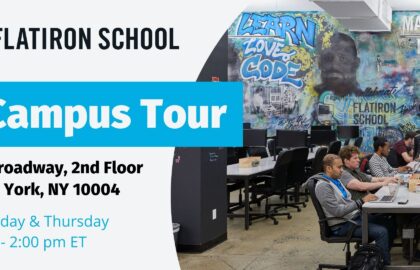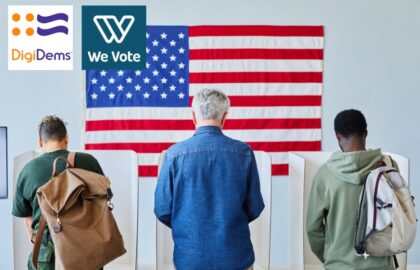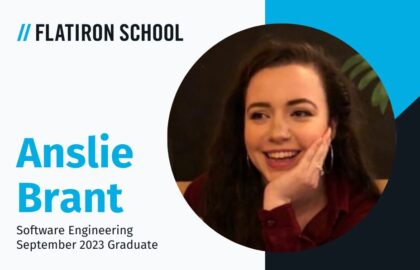Like many good stories, Alex H.’s coding journey started with pastry. She worked at bakeries and restaurants before moving over to the more savory side. Later, she continued her hospitality career as an event planner. You name it, she did it in hospitality.
At her last role, she became the “go-to” technical person when her company switched content management services four times in just three years. The event planning company had to start from scratch every time there was a new migration. “There had to be a better way of managing these updates, and by the last switch, I went from wondering how, to wanting to build it myself. That was the impetus for me to get into tech.”
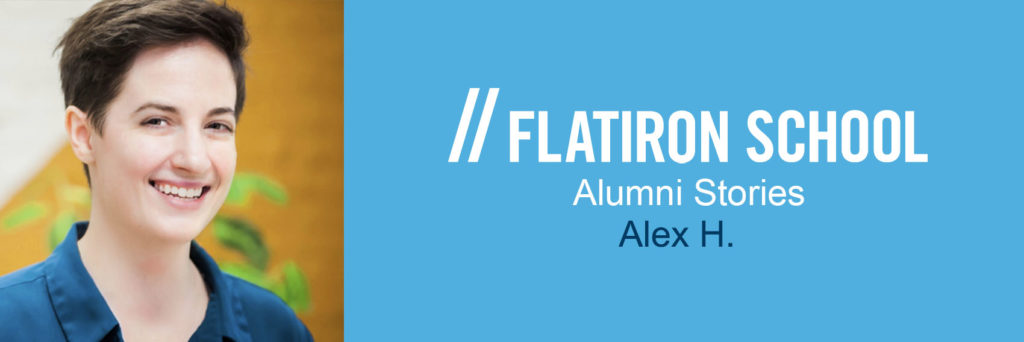
Everybody’s welcome in tech
Alex knew she wanted to pursue a career in tech, but found the time and financial commitment required to change careers a bit daunting. “Because this was a huge risk, it was going to take three months, I was going to be unemployed, and there wasn’t an instantaneous job waiting for me, ” she says. “So, I created a massive spreadsheet, and I weighed all the pros and cons. The founding dates, the languages that were taught, and the tuition. Everything.” She narrowed down her list and eventually chose Flatiron School.
She was able to try our Learn.co platform through the admissions process and our free online Coding Bootcamp Prep. “It was a perfect fit. The way everything was laid out, my personal learning style, and the way Flatiron School taught just went hand-in-hand,” she says. Instead of feeling friction when she didn’t know something, she was encouraged to learn how to solve the problem. “It wasn’t just a question of what I was learning, but how I was learning.”
Love was another factor. More specifically, our co-founder’s, Avi Flombaum, presentation on love and why Flatiron School was founded.
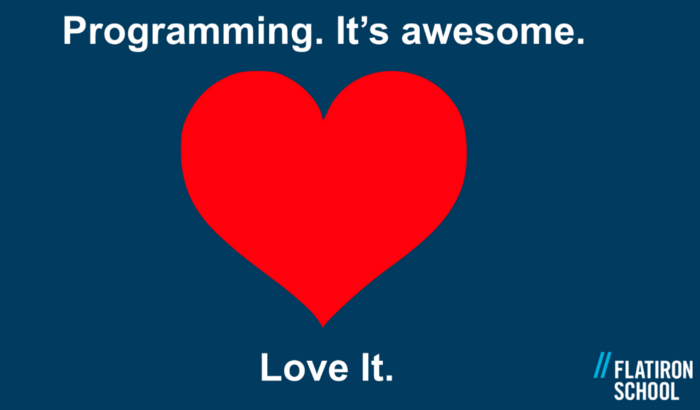
Plus, she was planning to move to Denver, where Flatiron School has a campus at WeWork’s The Hub location. “It was comforting to know I would have the support I needed before the program, during the program, and after the program.”
Finding your community in tech
Before she started the course, Alex wanted to gain some inspiration and connect with her community by attending the Lesbians Who Tech San Francisco Leadership Summit. Lesbians Who Tech is an organization that promotes diversity in the LGBTQ+ community within the tech industry. They also welcome allies. She wanted to attend the conference to hear prominent women — such as YouTube CEO Wojcicki and Stacy Abrams — and LGBTQ+ members speak about what it means to be a leader in tech.
Alex found out they also offer scholarships. She applied and was chosen as an Edie Windsor Scholarship recipient. As an Edie Windsor Scholar, she now has an established network of individuals who are going through coding bootcamps to turn to for support.
In the whirlwind of being accepted to Flatiron School and earning a scholarship, she realized she never visited the Chicago campus. What school experience wouldn’t be complete without a tour? On campus, she saw how she would fit in to the community. Her career coach, for example, came from the restaurant industry and they had a lot in common. She also discovered she had similar experiences with her fellow students.
Part of the learning process involves learning more about yourself. You’re changing your career and your life. You will be different. Alex says she considered herself a perfectionist, but she learned how to let go of having to “be right.” Opening up to new ways of thinking helped her solve problems in the future. “I was able to reclaim who I am as a person and be in an environment where we’re all here to learn and grow,” she says. “I don’t think I’ve made a more significant, or more positive, choice than coming to Flatiron School.”
Inclusivity in tech
What matters most to Alex after she graduates is her commitment to welcoming others. Whether it’s at a large company or a startup, she’s excited to help promote accessibility in tech. “As part of the LGBTQ community — in knowing what it feels like to be othered, and understanding what it feels like to be left out in one way or another — I don’t want to make someone else to feel that way,” she says.
Alex wants everyone to be accepted for who they are and even seemingly small gestures can create a huge impact to make someone feel included. “I don’t want anything that I have a part in to reinforce that feeling like you can’t or shouldn’t be who you are. It’s so important to reflect that ‘you are welcome,’ and knowing that ‘you’ can be applied in every context.”
A simple way to adopt a more inclusive mindset? Just ask. “When we think that our ideas are firm and unchanging, that lends to a specific level of inflexibility,” Alex says. “When it comes to considering a new idea or someone else’s experiences — that requires flexibility.”
Finding the right time to ask those questions is also important. “Be open to your questions and explore what they might be, but also carry that awareness with respect for the other person,” Ales says. “Be mindful that you’re trying to understand someone else’s lived experiences, and that may be a deeper topic than a water cooler chit chat.”
Most people are seeking community and ways to connect to others. If you’re worried about fitting in, Alex says you’re going to find one person you can connect with. Be open to icebreakers and don’t be afraid of opening up to others. They act as your support system and Alex says that comfort helped her be honest about how she was feeling or if she needed help.
Diversity initiatives like the efforts we support at Flatiron School and organizations like Lesbians Who Tech are important to support inclusivity in tech, because we are actively opening up opportunities to students who may not have that chance in a more traditional setting. While there’s a lot of openness in tech, there are still opportunities to create a more inclusive community.
While gatekeeping is still a problem the tech community faces, there are ways to overcome it. “In my short time as an active member of the community, I’ve noticed that — with more diverse folks getting involved in tech — we’re creating more welcome, open, inclusive spaces, and we’re continually open to learning how to improve.” Instead of creating barriers, reach out and make others feel welcome. You’ll find out that, by doing that, you’ll meet new friends, gain new experiences, and become a better person.


